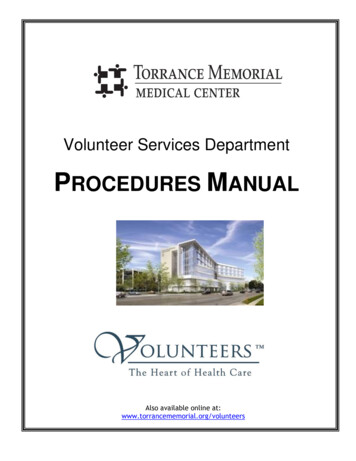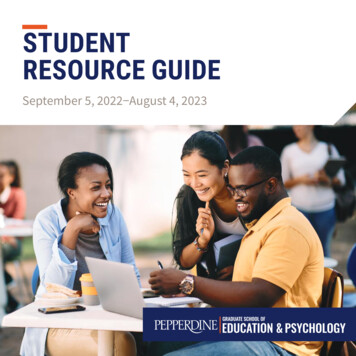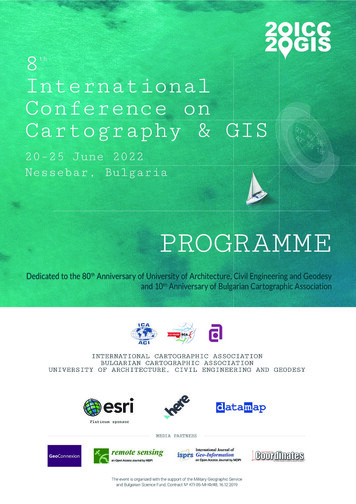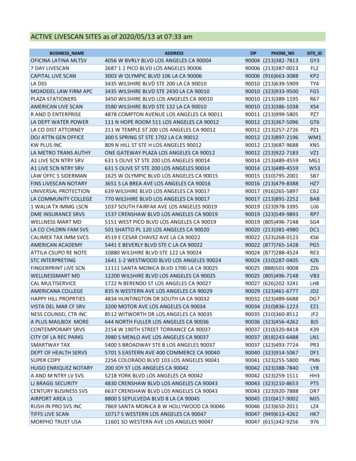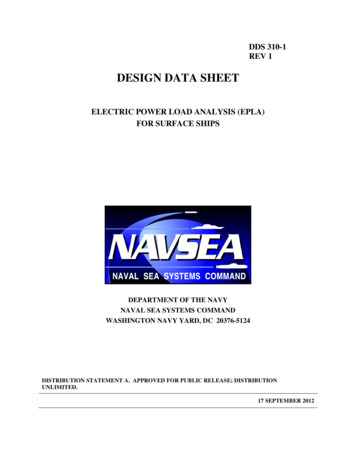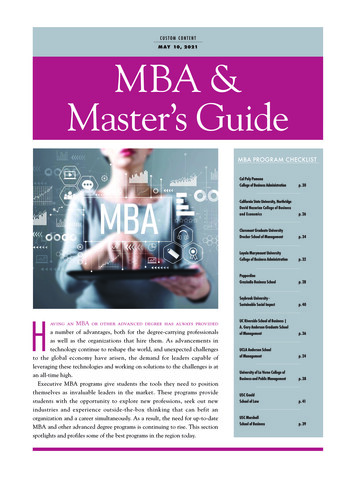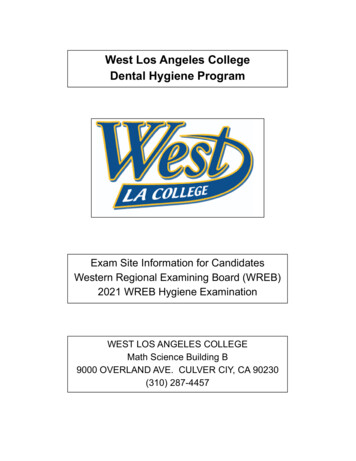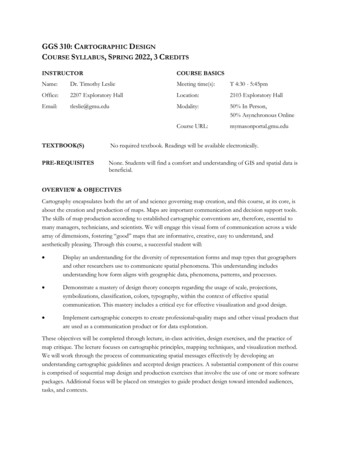
Transcription
GGS 310: CARTOGRAPHIC DESIGNCOURSE SYLLABUS, SPRING 2022, 3 CREDITSINSTRUCTORCOURSE BASICSName:Dr. Timothy LeslieMeeting time(s):T 4:30 - 5:45pmOffice:2207 Exploratory HallLocation:2103 Exploratory HallEmail:tleslie@gmu.eduModality:50% In Person,50% Asynchronous OnlineCourse URL:mymasonportal.gmu.eduTEXTBOOK(S)No required textbook. Readings will be available electronically.PRE-REQUISITESNone. Students will find a comfort and understanding of GIS and spatial data isbeneficial.OVERVIEW & OBJECTIVESCartography encapsulates both the art of and science governing map creation, and this course, at its core, isabout the creation and production of maps. Maps are important communication and decision support tools.The skills of map production according to established cartographic conventions are, therefore, essential tomany managers, technicians, and scientists. We will engage this visual form of communication across a widearray of dimensions, fostering “good” maps that are informative, creative, easy to understand, andaesthetically pleasing. Through this course, a successful student will: Display an understanding for the diversity of representation forms and map types that geographersand other researchers use to communicate spatial phenomena. This understanding includesunderstanding how form aligns with geographic data, phenomena, patterns, and processes. Demonstrate a mastery of design theory concepts regarding the usage of scale, projections,symbolizations, classification, colors, typography, within the context of effective spatialcommunication. This mastery includes a critical eye for effective visualization and good design. Implement cartographic concepts to create professional-quality maps and other visual products thatare used as a communication product or for data exploration.These objectives will be completed through lecture, in-class activities, design exercises, and the practice ofmap critique. The lecture focuses on cartographic principles, mapping techniques, and visualization method.We will work through the process of communicating spatial messages effectively by developing anunderstanding cartographic guidelines and accepted design practices. A substantial component of this courseis comprised of sequential map design and production exercises that involve the use of one or more softwarepackages. Additional focus will be placed on strategies to guide product design toward intended audiences,tasks, and contexts.
COURSE-SPECIFIC TECHNICAL ELEMENTSThis class will teach the technical application elements in Adobe Illustrator, the dominant commercialproduct used in the industry. There are no student/take-home licenses for this software. There are open-source (Inkscape) andcommercial alternatives to this software. If you wish to obtain software for your personal machine,such elements are outside the scope of course instruction. ArcGIS will be useful when managing and manipulating the spatial data for your final project.However, ArcGIS is not a suitable replacement for design-level software and should NOT be usedfor any submissions unless explicitly noted. You will be required to obtain the relevant spatial dataset for your final project.GGS COMPUTER LAB ASSISTANCEAll students in GGS courses should receive “swipe” access (using your Student ID) to the GGS StudentComputer Lab (Room 2102, Exploratory Hall) upon the start of the semester. If you are having problemswith door access, please e-mail the GGS department (ggs@gmu.edu) with SWIPE ACCESS in the subjectline of your email.If you experience problems with the computers (e.g., software or hardware issues) in the GGS StudentComputer Lab, please email College of Science IT (cosit@gmu.edu) for technical assistance.COURSE ASSESSMENTYou will be assessed in your attainment of the course learning outcomes through several methods. Thegroupings and weights of those assessments are listed belowPercentContent Exam35%SynchronousClass Activities10%Module andLab ActivitiesFinal Project35%20%The exam will be focus mainly on fill in the blank and free response, with a minimal level multiple choiceand true/false. I do not provide review sheets for exams.Each student will complete a course project. The course project requires you to make an original mapproduct. The topic and type of map is up to you. Details are provided as part of the online asynchronousinstruction.
TENTATIVE SCHEDULE (subject to change)WEEKSWeek 1, Jan 25IN-CLASSCourse Overview,What is a Map?Week 2, Feb 1Illustrator, Map DesignWeek 3, Feb 8Optional ClassWeek 4, Feb 15Discussion 1Week 5, Feb 22Optional ClassWeek 6, Mar 1Discussion 2Week 7, Mar 8Discussion 2 ReflectionDue Before ClassNo Class: Spring BreakOptional ClassWeek 9, Mar 29Discussion 3Week 10, Apr 5Map ModulesWeek 11, Apr 12Exam, Project DiscussionsWeek 12, Apr 19ExamFinal Exam Period, May 17Due Before ClassTechnical ModulesWeek 8, Mar 22Week 14, May 3Discussion 1 ReflectionFinal Project Presentation,Mar 15Week 13, Apr 26NOTESDraft and PeerReview DiscussionDiscussion 3 ReflectionDue Before ClassFull Credit for DraftProject Concept, 11:59pmDraft Maps Due Before ClassNo Class: Virtual 1-on-1sPeer Review Due Before ClassNo Class:Last Project submissionsProject Submissionsby 11:59pm
STUDENT EXPECTATIONSWhen part of this course, you are expected to be respectful of your peers and your instructor in both words andactions. This has several components:oCome to class. There is a strong positive correlation between the percentage of classes a student hasattended in the course and the student’s final grade for the semester. Please come to class on time coming late to class disturbs class activities and our learning process.oBe present while in class, with both the material and your classmates. You are expected to focus on classand refrain from activities that are unrelated to the class during course time, regardless of the screenspresent. Cell phones and other communicative devices are not generally part of the pedagogical elementsof this course. There is a firm expectation that all aspects of the class will be conducted with civility andrespect for differing ideas, perspectives, and traditions.oManage your time proactively. Keeping track of course deadlines and the upcoming assignments leads tosubstantially increased submission quality, and reduced student anxiety. Some labs and assignments cantake more time than they might you might initially expect.READING REFLECTIONSI am a proponent of writing to develop critical thinking skills. Writing facilitates learning and helps sharpen andcrystallize fuzzy thinking. In a sense, we do not know what we think exactly until someone tells us to express it inwriting; what you have to say and how you say it are inextricable. Making sense of the “quantum haze” whirlingaround in our head via clear, expressive writing is a lifelong challenge, and is a challenge that, like any art or craft,takes practice. For each day of in-class discussion, students will write a brief essay (about 500 words) expressingyour reaction to the readings. You should seek interesting ways to express ideas through word choices, analogiesand metaphors, phrasing, and varying sentence structure.I provide a potential prompt for you to respond to, but you are free to write in other ways that you connect to thereadings. In some instances, a personal observation, experience, activity, or event may stimulate a response to thereadings. Feel free to draw upon your outside experiences in crafting these reaction essays, as making connectionsin this way can be illuminating.When crafting essays keep in mind the nexus of the readings, the course content, and the current cultural zeitgeist.Producing finely polished products regularly is not the chief objective. The primary purpose is to have you expressyour thoughts and ideas vis-à-vis the reading. I am looking for agility, flexibility, and creativity in expression, butalso a clear tie to the readings presented. Reflections are not to be a set of containerized responses to each assignedreading with little relation to each other, but a cohesive presentation that follows a common theme. You areexpected to bring the readings together and not treat them as a set of bullet points that are progressively fleshedout.TECHNICAL EXPECTATIONSActivities and assignments in this course will regularly use the Blackboard learning system. Students are required tohave regular, reliable access to a computer with an updated operating system and a stable broadband Internetconnection.Elements of the course may also incorporate web-conferencing software such as Blackboard Collaborate andZoom. For these sessions, students are required to have a device with a functional camera and microphone forusage when they are speaking. At other times, I do not require cameras to be turned on but do appreciate it.The ability to manage files without assistance is an underlying requirement for completing the course activities.
oYou will likely want some form of portable (or easily accessible) electronic storage. Some of the files canbecome very large and numerous. I strongly suggest using a cloud service such as OneDrive (provided byMason) or Dropbox. Saving your work to a Mason machine or virtual machine is NOT reliable.oOrganizing your digital space is crucial to reliable progress and submission. I encourage developing asubfolder and naming convention that relies on something consistent such as dates or revision number(e.g. avoid “project-draft-TL-15 submitted final final”, I recommend something along the lines of“ProjectText Jan3”). Please save frequently while working on any assignments and keep separate backups.Students seeking to use ESRI proprietary software off-campus and/or on non-Windows machines are directed tothe Citrix Virtual Lab, for which instructions are provided on the course website. Adobe products are limited toon-campus usage. Software keys for self-installation are not provided for any software.When posting in an electronic space, where it is in the classroom chat or course discussion board, be cognizant ofyour grammar, spelling, diction, and tone. The same rules established for face-to-face discussions apply in theseelectronic spaces. Emoji or acronyms and abbreviations have no place in a classroom context.I do not serve as technical support. For elements of the course website not related to unlocking or viewing coursecontent, please contact Mason ITS.Students must use their Mason email account to receive important University information, including messagesrelated to this class.Please copy Dr. Leslie on any e-mail correspondence to outside parties if it is related to this course.GRADING STRUCTURE AND POLICIESEach student in a course will be afforded the same opportunities, held to the same requirements, and evaluatedaccording to the same criteria, except as required by university policies on the accommodation of students withdisabilities, or in the case of graduate and undergraduate students enrolled in the same course. The expectedsystem is the following:AA-BB-CDUndergraduates100 - 9291.9 - 8786.9 - 8281.9 – 7776.9 - 7170.9 - 65Graduates100 - 9392.9 - 8786.9 - 8180.9 - 71If you are not satisfied with your progress during the semester, please see me as early as possible; do not wait untilthe end of the semester to address these concerns.Students who do not complete the course project through to its final step are ineligible for grades above BEXTRA CREDITIn general, there are no offers for extra credit opportunities in this class, and requests are not entertained. Extracredit is extra work, and students who are having difficulty completing the required coursework seldom have thetime to complete additional assignments. If extra credit opportunities do arise throughout the course of thesemester, they will be announced and provided equitably to the entire class.
SUBMISSIONSAll submissions will be done through Blackboard.oFor assignments with multiple submissions in Blackboard, only the grade of the most recent submissionwill be graded / counted.oAssignments due on a University closure or delay date are still due on that day unless otherwise specified.oDo not simultaneously email your submission to the instructor. This will result in a grade of zero on thesubmission in blackboard.oUnless otherwise specified, you have one attempt to take any quiz or exam. No tests will be handed outafter the first person to finish has turned in their exam.oUnless otherwise requested, assignments should be submitted as PDF, with in-line text and tables (notscreenshots).oNo links to documents stored on services such as Google Drive will be accepted, only the actual file willbe graded.oStudents have 7 days after an assignment is graded to ask for reviews on the grade. All requests for gradeconsiderations must be done via email.oDrafts are not given feedback or graded unless students come to office hours with specific questionsregarding written drafts.oStudents are responsible for ensuring that their submitted files are readable. You can view or downloadyour files after uploading to confirm they are readable. Any corrupted file is treated as a non-submission.oIf you are interested in more detailed feedback on graded material, please follow up via email orscheduling a meeting with the instructor.oStudents can expect to have grades on submitted material within 4 business days of submission. Pleasewait to contact the instructor for at least that long.LATE WORKDue dates are listed for all course elements. As a general policy, late work is penalized, and in some cases notpermitted. Missing assignments are scored with a zero.oThe standard late work penalty is a 5% deduction for submissions between 6 and 48 hours of the duedate, and 15% after 48 hours of the due date. These deductions are based on the total points possible forthe relevant submission.oThere are posted end-of-semester cutoffs for all submissions to be graded, late or otherwise.oIf a student will miss classes due to a religious observance or participation in a University activity, they areobligated to notify the instructor within the first two weeks of the semester (University Policy AP.1.6.1).In such cases, a reasonable alternative opportunity will be provided.oValid documentation that could justify full credit for late submissions could include a conference programthat includes your presentation, military obligations, or conflicts with university-sanctioned activitiesdocumented by an appropriate university official.oBad things can happen at the last minute, and I encourage you to avoid planning for submissions rightbefore deadlines. While students will not be responsible for (documented) campus or blackboardproblems that disallow submission, there are no accommodations for personal power outages, softwareglitches, or hardware malfunctions.
SPECIFICATIONS GRADINGMost submissions are graded in the context of mastery of the outcomes for that assignment, with an emphasis onthe fully mastering the relevant content. This pedagogical approach results in grades of “demonstrates mastery”,“minimally meets requirements”, and “insufficient” for many submissions. The numeric assignments associatedwith categories other than “demonstrates mastery” are substantial penalties with the intent that the student willrevise and resubmit.Aside from late penalties, students can resubmit as many times as necessary to meet the relevant learning objectivewithout penalty.Students who have not achieved mastery on a third submission must meet with the instructor before future gradesare considered.Some course content is gated until a student demonstrates mastery in an earlier portion of the course.NAME PREFERENCEThe University enables students and employees to use a chosen first name and indicate their pronouns wherepossible, except when use of a legal name is required by University policy or state/federal law. I use male pronouns(he/him), and my last name is pronounced LESS-LEE. My preference is that you address me as “Professor,”“Professor Leslie” or “Dr. Leslie.” If there is a specific way that you would like me to address you––includingcertain pronouns–– I encourage you to let me know as well as to update your Mason file in Patriotweb. The MasonCode of Student Conduct expects that students will use the preferred name of their classmates and instructor.INSTRUCTOR AVAILABILITYThe best way to get ahold of me is by scheduling an appointment or sending me an email.1) Scheduling an appointment is managed through Navigate (navigate.gmu.edu).oTo schedule an appointment, first login. On the home page, click “Get Assistance”. On the followingpage choose “Academic Advising” for the type of appointment, “Faculty office hours” for the meetingtype, and “Geography Course Office Hours” for the Major/Program/Service. In the third page, choose“Department of Geography & Geoinformation Science” as your location, and then type my last name (itshould pop up after a few letters) in the Staff member box. The next page lets you pick a time slot, andthe final page confirms the appointment. If you are having trouble seeing my availability, please check thatyou are in the proper semester in the drop-down box in the upper right corner of the screen. If these timeslots do not align with your availability, please email me with at least three possible meeting times and wewill find a mutually convenient alternative.oAn online walkthrough for this process is also available on the course website.2) My email is listed at the top of this syllabus. I am usually quick to respond to student e-mails, withinreason. Students who e-mail me Monday - Thursday can ordinarily expect a response within 24 hours, oftensooner. Students who e-mail after 5 PM on Thursday or over the weekend can ordinarily expect a response bynoon on the following Monday. As email accessibility can be variable during the day, questions regarding courseelements due the same day should be sent with tempered expectations.Student e-mails tend to do several things that try my patience. Starting in 2022, my policy is that I will not respondto certain e-mails students send. These include emails surrounding:
1. The student could answer his/her own inquiry by reading the syllabus, watching the relevant videos, or readingthe instructions fully. I have endeavored to provide useful content – if there are missing elements, please let meknow and a solution will be implemented.2. The student missed class. I do not need to know the exact reason for a missed class. An e-mail is unnecessaryunless the impromptu absence involves missing an exam.3. The student wants to know what topics were missed during a class that was missed. The answer is always “youmissed what was on the syllabus.”4. The student is protesting a grade without reference to specific points of objection. These e-mails tend to beexpressive utility on the part of the student and do not require a response from me. Students interested inimproving their knowledge of material should schedule a meeting.5. The student is requesting that a module be made accessible without meeting the necessary requirements. Theanswer is “no”.6. The student is asking to round up a grade. The answer is “no”.7. The student is asking for an extra credit opportunity, which is addressed elsewhere in this syllabus. The answer is“no”.LETTERS OF RECOMMENDATIONI can only write a letter of recommendation for you if you have completed a semester in a course I have taughtwith a B or above.LATE ARRIVAL OF THE PROFESSORGeorge Mason’s policy is that if the instructor does not arrive within 15 minutes that the course meeting for theday is cancelled. This seems like an anachronism. I will inform students via e-mail in advance of class (with asmuch notice as possible) if class is cancelled for the day. I will also contact our departmental support staff ifsomething happened on the way to work. Failing that, assume the worst happened to me. I ask that students makesure that my story gets the proper treatment on a Law-and-Order episode. I also ask that my story be narrated byIdris Elba.
DIVERSITY AND INCLUSIONGeorge Mason University supports and recognizes that an inclusive and welcoming community is linked to ourstrategic goals and key to building a sense of belonging and well-being. I share this vision and am committed to itsimplementation at all levels and in all ways. The content presented in this course comes from an academic historythat is overwhelming white and overwhelming male. As a white male (and as a person), I will do what is within mypower to identify and step beyond racial, gender, and other boundaries in this shared educational space.Diversity is broadly defined to include such characteristics as, but not limited to, race, economic status, ethnicity,gender expression and identity, national origin, first language, religion, age, and disability. Diversity also entailsdifferent viewpoints, philosophies, and perspectives. We welcome and value individuals for their uniquecontributions. Attention to the breadth of diversity will help promote a culture of inclusion and belonging, wherediverse opinions, backgrounds, and practices can be voiced, heard, and respected. All members of the learningenvironment are encouraged to engage with the material personally, but to also be open to exploring and learningfrom experiences different than their own. Such an environment fosters growth and productivity among students,faculty, and staff.The reflection of Mason’s commitment to diversity and inclusion goes beyond policies and procedures to focus onbehavior at the individual, group, and organizational level. The implementation of this commitment to diversityand inclusion is found in all settings, including individual work units and groups, student organizations and groups,and classroom settings; it is also found with the delivery of services and activities, including, but not limited to,curriculum, teaching, events, advising, research, service, and community engagement. Notably, individuals areasked not to speak for the experience of others, nor to ask others to explain ‘the mindset’ of an identity they mayhave.The University promotes continuous monitoring and self-assessment regarding inclusivity. Please contact meimmediately if any elements of the course or institution, including my own statements, blindness, or actions, areinconsistent with the aspirations listed here, so that remedies can be implemented.OFFICE OF DISABILITY SERVICESI am committed to providing equitable access to learning opportunities for all students by upholding the laws thatensure equal treatment of people.Federal law mandates the provision of services at the university-level to qualified students with disabilities. Underthe administration of University Life, Disability Services implements and coordinates reasonable accommodationsand disability-related services that afford equal access to university programs and activities. Students can begin theregistration process with Disability Services at any time during their enrollment at George Mason University.If you are seeking accommodations for this class related to any sort of disability, detailed information about theDisability Services registration process is posted on their website. Students who suspect that they have a disability,temporary or permanent, but do not have documentation are encouraged to contact DS for advice on how toobtain appropriate evaluation. I encourage students who are considering using their accommodations to declareand discuss them with me as soon as possible, as I can only provide accommodations after receiving theauthorizing documentation from Disability Services.
PRIVACYStudent privacy is governed by the Family Educational Rights and Privacy Act (FERPA) and is an essential aspectof any course. All course materials posted to Blackboard or other course site are private; any materials that identifyspecific students (via their name, voice, or image) must not be shared with anyone not enrolled in thisclass. Live Video Conference Meetings (e.g. BB Collaborate, Zoom) that include audio or visual informationfrom other students must be viewed privately and not shared with others in your household. As your instructor, I cannot discuss your educational record with your parents, your friends, or anyoneexcept for you without explicit written permission. Because your GMU email is the only one that can beidentified as belonging to you, the only way to communicate with you via email is through your GMUaddress. If you send communications from a non-GMU email account, you will receive a response tellingyou to use your GMU email. Outside video and/or audio recording is permitted only with the prior written consent of the professoror if recording is part of an approved accommodation plan. Recordings of class meetings that includeaudio or visual information from other students are private and must not be shared. No unauthorized guests will be permitted in class.SEXUAL HARASSMENT, SEXUAL MISCONDUCT, AND INTERPERSONAL VIOLENCEGeorge Mason University is committed to providing a learning, living, and working environment that is free fromdiscrimination and a campus that is free of sexual misconduct and other acts of interpersonal violence to promotecommunity well-being and student success. We encourage any community member who believes that they havebeen sexually harassed, assaulted, or subjected to sexual misconduct to seek assistance and support.As a faculty member and designated “Responsible Employee,” I am required to report all disclosures of threats oroccurrences of sexual assault, interpersonal violence, and stalking to Mason’s Title IX Coordinator. If you wish tospeak with someone confidentially, please contact the Student Support and Advocacy Center (703- 380-1434),Counseling and Psychological Services (703-993-2380), Student Health Services, or Mason’s Title IX Coordinator(703-993-8730; cde@gmu.edu).ACADEMIC INTEGRITYThe integrity of the University community is affected by the individual choices made by each of us. GMU has anHonor Code with clear guidelines regarding academic integrity and dishonest practices. Three fundamental andrather simple principles to always follow:(1) all work submitted be your own;(2) when using the work or ideas of others, including fellow students, give full credit through accuratecitations; and(3) if you are uncertain about the ground rules on a particular assignment, ask for clarification.Writers give credit through accepted documentation styles, such as parenthetical citation, footnotes, or endnotes.Paraphrased material must also be cited, using MLA or APA format (or similar). It is your responsibility tounderstand what constitutes plagiarism and familiarize yourself with the Honor Code. Under no circumstances is itpermissible to cheat, plagiarize, steal, or lie in matters relating to academic work.
With independent submission, you may discuss your ideas with others and conference with peers on drafts of thework; however, it is not appropriate to give your paper to someone else to revise. You are responsible for makingcertain that there is no question that the work you hand in is your own. If only your name appears on anassignment, your professor has the right to expect that you have done the work yourself, fully and independently.If the assignment involves collaborative work, the names of all contributors should appear on the work.Participation in some kinds of online study sites violate the Mason Honor code: these include accessing exam orquiz questions for this class; accessing exam, quiz, or assignment answers for this class; uploading of any of thecourse materials or exams; and uploading any of your own answers or finished work. Posting any course materialson any web site or providing any course content to someone who is not a current student without my writtenpermission will be treated as academic misconduct, regardless of intent.There is not sufficient space here to list every possible behavior or action that constitutes cheating. Any action thatundermines the academic integrity of the course, the students, or the university may constitute a violation of thepolicy. Don’t cheat. You know exactly what I’m talking about.The principle of academic integrity is taken seriously, and violations are treated gravely. No grade is importantenough to justify academic misconduct, and ignorance is not an excuse. All Honor Code referrals from this coursewill recommend a sanction of at least course failure. The official GMU policies are available from the Office ofAcademic Integrity.OTHER GMU RESOURCESThere are numerous campus resources that are available to help you succeed. For more details, please see a list ofsome of these resources online at rces-on-campus/. A few ofthese include: Counseling and Psychological ServicesMason Food PantryStudent Support and Advocacy CenterMODIFICATIONSThis syllabus is subject to change at any time throughout the semester. Any syllabus changes or additions will becommunicated and will be considered final.
Name: Dr. Timothy Leslie Meeting time(s): T 4:30 - 5:45pm Office: 2207 Exploratory Hall Location: 2103 Exploratory Hall Email: tleslie@gmu.edu Modality: 50% In Person, 50% Asynchronous Online . the Citrix Virtual Lab, for which instructions are provided on the course website. Adobe products are limited to
